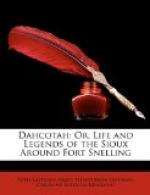The cause was soon ascertained. To speak poetically, the birds had flown—in plain language, the prisoners had run away. They were not bound, their honor had been trusted to;—but you cannot place much reliance on the honor of an Indian with a prison in prospect. I doubt if a white man could be trusted under such circumstances. True, there was a guard, but, as I said, ’twas a dark night.
The troops returned in fine health, covered with dust and fleas, if not with glory.
CHAPTER V.
It is time to return to Sullen Face. He and Forked Horn, on their return to the village, were informed of what had occurred during their absence. They offered to fulfil the engagement of the chief, and accompanied by others of the band, they started for Fort Snelling. The wife of Sullen Face had insisted upon accompanying him, and influenced by a presentiment that he should never return to his native village, he allowed her to do so. Their little boy quite forgot his fatigue as he listened to his father’s voice, and held his hand. When they were near the fort, notice of their approach was sent to the commanding officer.
The entire force of the garrison marched out to receive the prisoners. A large number of Indians assembled to witness the scene—their gay dresses and wild appearance adding to its interest.
Sullen Face and Forked Horn, with the Sioux who had accompanied them, advanced to meet the battalion. The little boy dressed as a warrior, his war-eagle plumes waving proudly over his head, held his father’s hand. In a moment the iron grasp of the soldier was on the prisoner’s shoulder; they entered the gate of the fort; and he, who had felt that the winds of Heaven were not more free than a Dahcotah warrior, was now a prisoner in the power of the white man. But he entered not his cell until he had sung a warrior’s song. Should his enemies think that he feared them? Had he not yielded himself up?
It was hard to be composed in parting with his wife and child. “Go my son,” he said, “you will soon be old enough to kill the buffalo for your mother.” But to his wife he only said, “I have done no wrong, and fear not the power of my enemies.” The Sissetons returned to the village, leaving the prisoners at Fort Snelling, until they should be sent to Dubuque for trial.
They frequently walked about the fort, accompanied by a guard. Sullen Face seemed to be indifferent to his fate, and was impressed with the idea that he never would return to his home. “Beautiful country!” said he, as he gazed towards the point where the waters of the Mississippi and St. Peter’s meet. “I shall never look upon you again, the waters of the rivers unite, but I have parted forever from country and friends. My spirit tells me so. Then welcome death! they guard me now with sword and bayonet, but the soul of the Dahcotah is free.”
After their removal to Dubuque, the two prisoners from Fort Snelling, with others who had been concerned in the murder, suffered much from sickness. Sullen Face would not complain, but the others tried to induce him to make his escape. He, at first, refused to do so, but finding his companions determined upon going, he at last consented.




